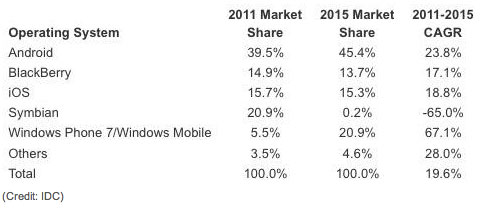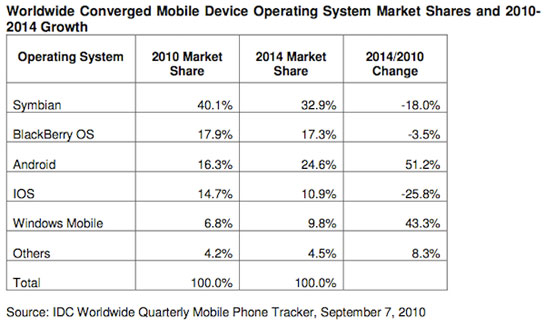I’m Sorry, the Future of Phones is Unknowable
By Harry McCracken | Tuesday, March 29, 2011 at 1:39 pm
 Research firm IDC–a sister company of my former employer, PCWorld–has released its latest estimates of the current and future marketshare of major smartphone operating systems. The headline news: It’s predicting that Android will continue to boom and that Microsoft’s Windows Phone, currently on the ropes, will bounce back to second place by 2015.
Research firm IDC–a sister company of my former employer, PCWorld–has released its latest estimates of the current and future marketshare of major smartphone operating systems. The headline news: It’s predicting that Android will continue to boom and that Microsoft’s Windows Phone, currently on the ropes, will bounce back to second place by 2015.
Here are IDC’s numbers for 2011 and 2015 (I swiped them from Don Reisinger’s post at Cnet):
But here’s an earlier round of IDC figures, from September of last year–I borrowed these ones from Betanews’s Joe Wilcox–when the big news was that iOS’s share was going to drop by 26 percent by 2014:
Wow–last fall’s predictions for 2014 are strikingly different from this spring’s ones for 2015. Now IDC thinks that Android will do even better than it thought before, and that iOS’s share will slip by just .4 percent, not 26 percent. And its current projection for Windows in 2015 is more than double its old one for Windows in 2014.
So what happened? That’s easy: In February, Nokia and Microsoft announced an agreement that will make Windows Phone the primary operating system on Nokia smartphones. With the deal in place, Symbian is heading for retirement. IDC’s 2015 projections involve divvying up nearly all of Symbian’s marketshare among Android, Windows Phone, and iOS.
As of right this very moment, that’s’s a perfectly sensible piece of guesswork about how Symbian’s exit will affect the market.
Except…
The very fact that IDC’s projections were so heavily profoundly by the Nokia-Microsoft news shows that all estimates about what smartphone marketshare will look like in a few years are hopeless. The Nokia-Microsoft alliance isn’t a once-in-a-lifetime, world-changing stunner–it’s a big twist, but no bigger than numerous other ones that have impacted phones over the past few years. And plenty more developments of equal significance will happen between now and 2015.
The more I think about this, the more I believe that it was painfully obvious in September of 2010 that the chances of Symbian’s share being 32.7 percent in 2014 were very low. The venerable operating system simply isn’t competitive, and the only way it could have held on to nearly a third of the market would have been if it got much, much better very, very quickly. Nothing about the Symbian saga over the past four or five years suggests that was likely to happen.
In other words, it would have been smart in September 2010 to predict Symbian’s share cratering by 2014, even if you didn’t know the exact means by which that would happen.
For similar reasons, prognostications about the BlackBerry OS based on simple projections don’t work. Either RIM is going to take a great leap forward with some terrific phones based on its new QNX OS (in which case its share might stay stable or grow) or the new BlackBerries are going to continue to feel like visitors from a previous era (in which case I don’t see how BlackBerry OS will have even 13.7 percent share by 2015). Graceful degradation based on things not changing much is the least likely option.
(What’s my personal projection about the fate of RIM? Well, I’m not sure just yet. But this is much is obvious: When the PlayBook tablet ships next month, it’s likely to be a leading indicator for the BlackBerry platform in general. For better or for worse.)
When I wrote about IDC’s September numbers, I titled my post “The Only Safe Prediction About the Future of Phones: It’s Unpredictable.” That may have been too cautious a way to put it. It’s not so much that things might change in ways that could surprise even experts: they will change in ways that will surprise even experts. The fact that IDC’s estimates from just a few months ago are already obsolete is a powerful reminder of that.
6 Comments
Read more:















March 29th, 2011 at 2:13 pm
Another thing that happened since then was the iPhone being available on Verizon.
So I'd say that IDC's predictions look like they would be reasonable if no game changing partnerships occur before 2015.
March 29th, 2011 at 2:39 pm
Harry, have you ever read any Hayek? If not, you're channeling him intuitively. This sort of future-planning/forecasting is utter foolishness. Someone (I thought it was here on technologizer) took a look at a lot of these forecasts from the past, just to show how idiotic the forecasters were.
Unfortunately, this same sort of forecasting based on current trends happens all the time in financial markets, wehre it's much more dangerous to all of us. Calling out this chicanery wherever it is found is a service to the world. Thank you, good sir.
March 30th, 2011 at 9:53 am
I haven't, but I'll check him out…
March 29th, 2011 at 4:04 pm
The issue is what will iOs5 and iOs6 be like and will apple innovate beyond the basic touch interface?
If and when Apple leaves Google behind (maps etc) do they change the game again and if so all the projections change.
This is not certain but it is probably certain that MSFT, Google or RIM will most likely not do anything that changes the playing-field much. They may take advantage of opportunities in channel or hardware but they will not be the ones to change the paradigm
March 30th, 2011 at 7:45 am
Finally, someone with some sense. In the tech industry, predicting something that is 4 years out is absurd. The only things that seems to happen with regular cadence is that chips get faster and devices get smaller.
4 years ago…
– iPhone 1 is released in January 2007
– Android v 1.0 won't be released for another 1.5 years (Sep 2008)
– Nokia won't own Symbian for nearly more 2 years (December 2008)
– Windows Photon won't be cancelled for another year (circa 2008)
– webOS won't be released until 2009 and subsequently bought by HP in 2010.
– Blackberry… well… they seem pretty much the same to me.
Did I miss anybody?
This is just the phone market. Back then tablet PC was the closest thing to an iPad and the Playstation Eye was the closest thing to Kinect. We're not talking about either of those now — except to say how awful they are compared to their counterparts.
These predictions are for simpletons and nothing more than an exercise in futility.
March 30th, 2011 at 11:59 am
And its fun how one untried platform with a major player behind (nokia + WP7) get so large a percentage but HP and WebOS gets nothing… minor detail and so far the only vendor with a desktop to miniphone one OS coverage… sure that will not get any traction at all…. NOT